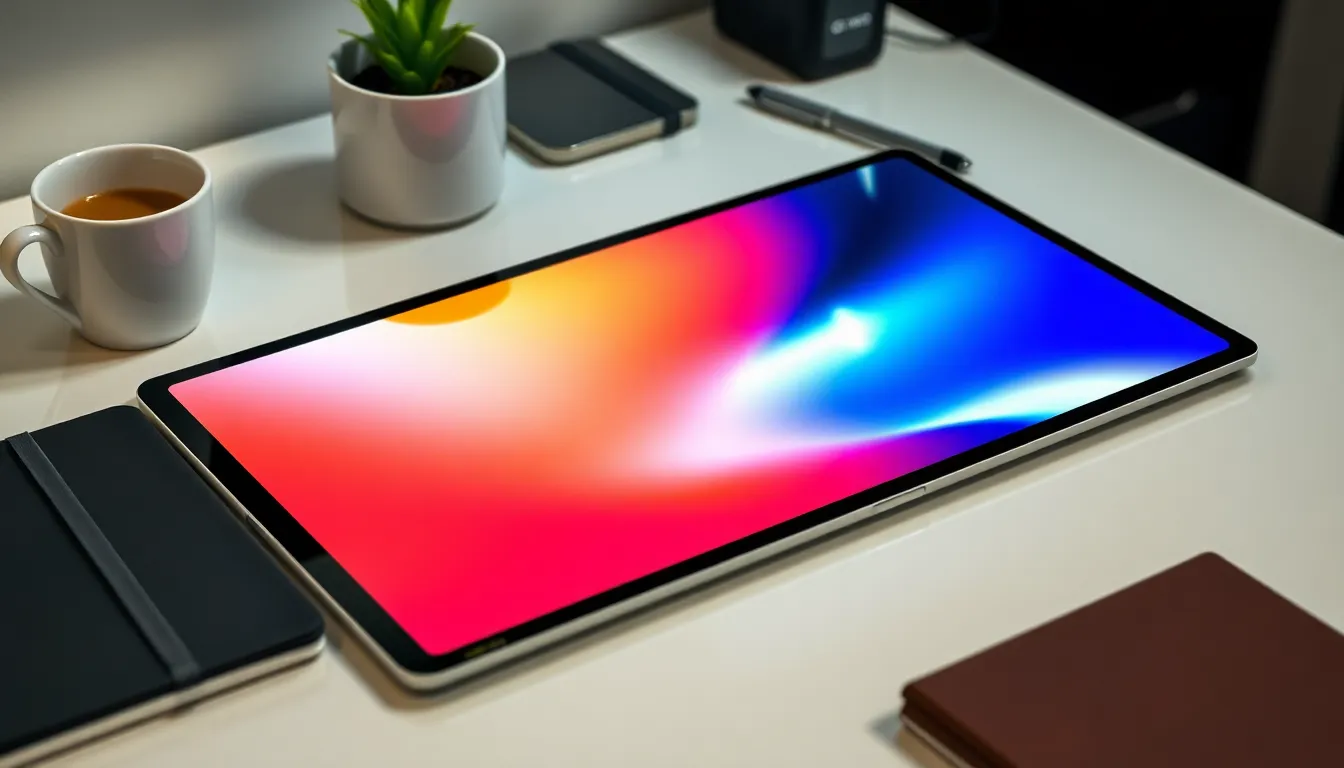Table of Contents
ToggleThe tablet industry is buzzing with excitement and innovation, and it’s hard to keep up with the latest developments. From sleek designs to mind-blowing technology, tablets are evolving faster than a cat meme goes viral. Whether you’re a tech enthusiast or just someone who loves scrolling through social media, there’s something happening that could change your digital experience forever.
Overview of Tablet Industry News
Tablet manufacturers continually introduce groundbreaking features that engage users. The latest models showcase enhanced processing power, with some devices featuring up to 16GB of RAM for seamless multitasking. Improved display technology, such as OLED and Mini-LED screens, attracts users looking for superior visual experiences.
Battery life remains a focal point in innovation, with some tablets boasting up to 20 hours of use on a single charge. Companies are prioritizing faster charging solutions, allowing users to power up quickly.
Furthermore, many new tablets incorporate AI technology that personalizes user experiences. Voice recognition features enhance accessibility and streamline daily tasks. Enhanced security features, like facial recognition and fingerprint sensors, ensure user data remains secure.
Emerging trends indicate a shift toward more sustainable materials in tablet design. Brands are investing in environmentally friendly practices, reflecting a growing consumer demand for sustainable products. The presence of 5G connectivity in many recent launches revolutionizes the mobile internet experience, allowing for faster download speeds and uninterrupted streaming.
Market reports show a strong growth trajectory in the tablet industry. Analysts predict a significant increase in sales, particularly in education and remote work sectors. Prominent brands are continuously expanding their offerings to meet diverse consumer needs, with focused strategies that cater to different market segments.
The tablet industry continues to evolve rapidly, driven by technological innovations and changing consumer demands. Each advancement solidifies tablets as essential tools for productivity, entertainment, and education.
Recent Trends in Tablet Development

Tablet development showcases remarkable changes driven by innovation and user needs. Manufacturers prioritize enhanced functionality and user experience, leading to significant shifts in design and technology.
Innovations in Hardware
Enhanced hardware capabilities define today’s tablet market. Tablets now commonly feature up to 16GB of RAM, enabling seamless multitasking for both professionals and casual users. Superior display technologies like OLED and Mini-LED improve visual quality, offering vibrant colors and deeper contrasts. Extended battery life remains a notable advancement, with some models delivering around 20 hours of use on a single charge. Meanwhile, faster charging options help minimize downtime. The transition towards lightweight materials enhances portability, making tablets more convenient for on-the-go usage. This focus on hardware innovation reinforces the role of tablets as essential tools for various applications.
Software Enhancements
Software advancements enhance overall functionality and user satisfaction. Tablets increasingly leverage AI technology to provide personalized experiences, adapting to individual user preferences and habits. Enhanced security features, such as facial recognition and advanced fingerprint sensors, ensure that user data remains safe. The integration of 5G connectivity revolutionizes online activities, allowing for rapid downloads and smooth streaming without interruptions. Cloud-based solutions improve collaboration and access to files across devices, supporting remote work and learning environments. Tablet operating systems receive regular updates, featuring user-friendly interfaces and improved performance. These software improvements solidify tablets as vital devices in both professional and everyday settings.
Market Analysis
The tablet industry shows robust growth, driven by constant innovation and evolving consumer demands.
Leading Brands and Their Strategies
Apple, Samsung, and Microsoft dominate the market, each employing distinct strategies. Apple focuses on seamless integration within its ecosystem, enhancing user experience through consistent software updates. Samsung emphasizes diverse offerings, catering to consumers with various budgets and needs. Microsoft targets productivity users by integrating powerful software solutions, such as Microsoft Office Suites, which enhance tablet functionality. Each brand continually invests in cutting-edge technology to maintain competitiveness, including the latest advancements in processing power and display quality.
Consumer Preferences and Behavior
Purchasing decisions reflect changing consumer preferences, heavily influenced by remote work and online education trends. Many users prioritize tablets with long battery life, seeking devices that can last through extended usage without a charge. Screen quality also plays a critical role, as customers favor high-resolution displays for streaming and gaming experiences. Additionally, sustainability is becoming increasingly important, with consumers leaning towards brands that use eco-friendly materials. As AI technology gains traction, more users appreciate personalized experiences tailored to individual needs, further shaping market dynamics.
Impact of Emerging Technologies
Emerging technologies significantly reshape the tablet industry, enhancing user experiences and transforming functionality across the board.
Role of AI and Machine Learning
AI technology personalizes user interactions, adapting to individual preferences through advanced algorithms. Machine learning capabilities enable devices to analyze usage patterns, providing tailored app recommendations. Tablets equipped with AI can optimize performance, like adjusting battery consumption based on user habits. Voice recognition becomes increasingly refined, allowing seamless communication through virtual assistants. Security features benefit from AI, where advanced facial recognition and biometric sensors ensure user data remains protected. With these innovations, productivity and efficiency reach new heights.
5G Technology and Connectivity
5G connectivity revolutionizes how users experience internet access on tablets. Download speeds soar, allowing users to stream high-definition content without buffering. This technology enhances remote work capabilities, enabling seamless collaboration through cloud-based applications. Tablets with 5G also support augmented reality experiences, making immersive learning and gaming more accessible. Additionally, the reduced latency associated with 5G ensures lag-free gaming and smooth video conferencing. Manufacturers continue to prioritize integration of this technology, reflecting its growing importance in today’s digital landscape.
Future Predictions for the Tablet Market
Market analysts predict a substantial growth trajectory for the tablet industry as innovation continues to redefine the user experience. Leading brands target specific consumer needs through enhanced features and functionalities. Tablets that integrate advanced processing capabilities, such as 16GB of RAM, provide users with seamless multitasking experiences. New display technologies like OLED and Mini-LED contribute to richer visual experiences, appealing both to casual users and tech enthusiasts.
Battery life advancements remain a high priority, with some models expected to offer up to 20 hours of use on a single charge. Quick charging solutions are also on the rise, further accommodating user demands for efficiency. AI technology is likely to become even more pervasive, enhancing personalized user experiences while optimizing security through features like facial recognition and fingerprint sensors.
Sustainability trends will shape materials used in tablet designs, addressing growing consumer awareness regarding eco-friendliness. The shift toward incorporating 5G connectivity indicates an industry transformation, as faster download speeds will elevate online experiences, particularly in streaming and gaming.
Consumer preferences hint at a strong emphasis on long battery life, high-resolution displays, and environmentally friendly materials. Brands that effectively tap into these preferences will likely lead the sector. As remote work remains a trend, educational use of tablets is also expected to grow.
Emerging technologies like machine learning and artificial intelligence will continue influencing tablet designs. Optimization of device performance through these technologies can take user engagement to higher levels. 5G integration promotes high-definition streaming and seamless collaboration, making tablets crucial for various applications. Overall, the tablet market appears poised for sustained growth as technological advancements align with evolving consumer demands.
The tablet industry is on the brink of remarkable transformation. With advancements in hardware and software, tablets are becoming more integral to daily life. Enhanced processing power and innovative display technologies are setting new standards for user experience.
As brands focus on sustainability and AI integration, the future looks bright for both casual users and professionals. The growing demand for high-performance tablets in education and remote work underscores their importance in today’s digital landscape.
With continuous innovation and a keen eye on consumer preferences, the tablet market is set to thrive, offering exciting opportunities for users everywhere.




